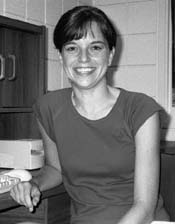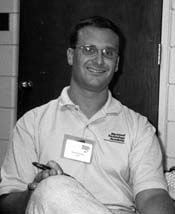|
|
Academy Trains Tech-Savvy Teachers and AdministratorsBy Neil A. GrauerSPSBE |

If you want a concise explanation of why it rains, just ask the Snow Hill Elementary School third-grade students of Sara Elburn, who in May received a master of science degree in Technology for Educators.
Using a sophisticated Web-based learning project created by Elburn in summer 2000 during an intense three-week fellowship, the Worcester County third-graders learned to unravel the mysteries of how the water cycle of evaporation to condensation to precipitation works. Using information they gleaned from the Internet, they created an explanatory slide show with computer graphics software, all part of Elburn's innovative plan to employ technology to enhance her students' ability to gather information by reading.

|
| Third-grade teacher Sara Elburn |
"The whole point of this is to give students an authentic opportunity to be informed by using more than one medium--using more than just a magazine, for example, but also using the Internet, an electronic encyclopedia and other sources," explains Elburn, who was one of 115 teachers, library media specialists and other educators from across Maryland who participated last year in the Maryland Technology Academy Leadership Program.
This year, 120 Academy Leadership Fellows participated in the third annual session, which was held from July 23 through Aug. 9 at Towson University.

|
| Curriculum coordinator Ryan Imbriale |
Created in 1998 by the Maryland General Assembly, the Maryland Technology Academy is operated jointly by the Johns Hopkins Center for Technology in Education, which is part of the School of Professional Studies in Business and Education; Towson University; and the Maryland State Department of Education. At the academy's flagship Leadership Program, educators learn not only to use technology to enhance instruction and improve student achievement but also the leadership skills necessary to assist others in their schools to use technology more effectively.
In addition, an offshoot called Satellite Programs is run in regional school districts throughout Maryland for more than 600 participants who focus more on the practical integration of technology in the classroom and less on the leadership aspect. The Satellite Programs were created to respond to the growing demand for help in applying technology in the classroom.
Among SPSBE faculty and staff who play major roles in the academy's operation are Jacqueline Nunn, director of SPSBE's Center for Technology in Education; Sarah McPherson, CTE's associate director, who was instrumental in the academy's initial curriculum development; and CTE instructors Ryan Imbriale and Dinah Little.
The academy's yearlong Leadership Program includes face-to-face meetings and sessions conducted via an Electronic Learning Community, but its most intense portion is the Summer Institute.
Those selected to participate in the Summer Institute get a $1,200 stipend. Upon completion of the program, they can receive either Hopkins graduate credit, Towson graduate credit or Maryland State Department of Education continuing education credits. A number of the fellows will make presentations at regional and national conferences on the new applications of technology to education, and some will assume leadership positions in their school districts.
"The big emphasis of this academy is to build leadership skills and to promote the use of technology to improve student learning," explains curriculum coordinator Ryan Imbriale, who received his master of science in technology for educators in 2000. "The process fellows go through is very difficult. They have to focus on how technology benefits the students, not just the use of technology for technology's sake. We want teachers to think critically about the use of technology in their classrooms.
"The other powerful thing about this academy is that we are building a network of leaders throughout the state," he says. "And this network is going to grow larger and larger."
Competition to enter that network is growing. This year, more than 300 applicants sought to become one of the 120 fellows selected for the academy's Summer Institute.
Prior to attending the Summer Institute, fellows review subject areas that need to show measurable improvement in student achievement, such as math, reading or writing scores, Imbriale explains. Then they design a "unit of instruction" that will help them to meet their improvement goal. While at the Summer Institute, they select an activity from their unit to be transformed into a detailed project employing technology. After completing the Summer Institute, they return to their schools and put their plan to work, either introducing it to students or using it to enhance faculty development.
"Technology is for everybody," Imbriale says. "Teachers need to understand how to use it to accommodate all learners, [including] how to deal with students with disabilities and achieve universal access to knowledge with the aid of technology."
A list of projects completed during Summer Institute sessions shows that technology also addresses every subject. Titles range from "A Treasure Hunt for Change in Math Instruction" to "Ancient Rome," "Oil Spills and Pollution," "Creating Hot Topics Pages to Improve Student Achievement in Writing," "Don't Click Now ... The Planet Is at Your Fingertips" and, of course, the project Sara Elburn designed for her third-graders: "Rain, Rain, Go Away."
| GO TO SEPTEMBER 4, 2001 TABLE OF CONTENTS. |
| GO TO THE GAZETTE HOME PAGE. |